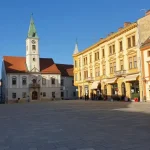January 6, 2020 – A quick comparison of the Croatian Presidential election results o 2014 and 2019 shows where Kolinda lost, as well as a rather interesting anomaly in the diaspora.
The people have spoken, and Croatia has voted for a new President, former SDP Prime Minister Zoran Milanovic, who beat incumbent HDZ President Kolinda Grabar-Kitarovic by a comfortable margin of more than 100,000 votes, 52.67% to 47.33%, 1,034,389 votes to 929,488, a margin of victory of 104,901.
International media are reporting that voters moved to the left, but a little research into the statistics of the 2014 election, where Grabar-Kitarovic beat Ivo Josipovic in a tight race, shows that the outcome of the election was more a case of people not voting for the candidate on the right, rather than voting for the man on the left.
Kolinda’s 929,488 votes compared very poorly with her 2014 haul of 1,114,945, down a massive 20%, while Milanovic actually got less votes than Josipovic’s 1,082,436
This was more a case of an election lost than an election won. A quick look at the official results from both elections show where Kolinda lost the battle – right in the heart of Zagreb. Not only did almost 50,000 less people in the capital vote for her than 5 years previously, but it was one of only three regions in the country (Zagreb County and Krapinsko-Zagorska were the others) where more people voted for Milanovic than Josipovic. The 2019 swing in the city of Zagreb alone was 58,205, more than half the margin of victory.
As you can see from the table above, the other main regions to desert Kolinda were HDZ strongholds in eastern Croatia, as well as Splitsko-Dalmatinska. In fact, the only place where Kolinda increased her vote from 2019 was in the diaspora, where there was a significant increase in the vote for both candidates… but herein lies an interesting story.
We recently took a closer look at the voting patterns in Croatian elections and referenda. The diaspora is a very vocal and influential part of Croatian society, with their remittances more than 2 billion euro a year (more than direct foreign investment in Croatia), and I was surprised to see how few of them actually voted, particularly in Australia, which has arguably the most vocal diaspora of all. Just over 1,000 Australian Croats votes in the first round of the Presidential elections. You can see more about the diverse voting patterns among the Croatian diaspora in this TCN feature.
So with such a surge in support for Kolinda abroad, surely this showed that the diaspora was rallying in support for their HDZ President.
Well, not quite…
Votes for Kolinda were sharply down in the countries with large Croatian diaspora – Germany, Australia, Canada, USA – and mirrored the voting patterns within Croatia. With one big exception. Bosnia and Hercegovina.
While not a single other region increased their vote for Kolinda (unless you count 7 extra votes in Ireland after the huge exodus there over the last few years), not only did the very loyal HDZ base in Hercegovina increase the vote, they more than doubled it, from 16,160 votes in 2014, to 32,647 yesterday.
And if the statistics of the diaspora are analysed without BiH, they make for fairly grim reading for Kolinda as well. The overall vote for her was about a third less, while Milanovic increased the Josipovic vote in all key countries. The diaspora preference for HDZ is still huge, but in terms of voting patterns, there seems to be a small trend developing.
Is it all bad news for HDZ? Not at all. This was an election lost by voters not turning up, rather than people voting en masse for the other side. Perhaps a few lessons learned in voter turnout from those chaps in Siroki Brijeg or Ljubuski could do the trick…
For the latest in politics from Croatia, follow the dedicated TCN section.







